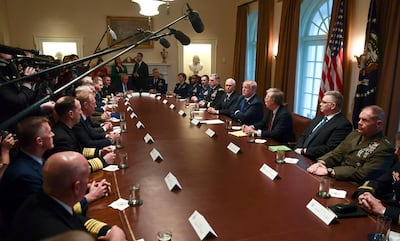The United States moved closer to a decision on its response to gas attacks alleged to have been carried out by the Syrian government on rebels near Damascus as President Donald Trump talked of military options and Washington's ambassador to the United Nations, Nikki Haley, promised a response regardless of Security Council resolutions.
For a second time on Monday, Mr Trump addressed the US deliberations in response to a chemical weapons attack reported in Douma two nights ago.
"We're getting some very good clarity" on who could be responsible for the attack, Mr Trump said.
In a reference to his options of launching punitive strikes against the government of Bashar Al Assad, Mr Trump suggested he would be heading in that direction.
"We have a lot of options militarily, and we'll be letting you know pretty soon, probably after the fact," Mr Trump said, appearing to give confirmation from the US government on its course of action.
Mr Trump emphasised the idea of deterrence against the use of chemical weapons, a red line for the United States. “We're going to make a decision tonight or shortly thereafter... We can’t let that happen in our world, especially when we're able to [stop it].”
He said the attack on Douma that killed 48 people and injured hundreds more “will be met forcefully”.
Striking a forceful tone, too, Ms Haley criticised the United Nations and said that "history will record this as the moment when the Security Council either discharged its duty or demonstrated its utter and complete failure to protect the people of Syria".
"Either way, the United States will respond,” she said.

Robert Ford, the US last ambassador to Syria (2011 - 2014) and a fellow at the Middle East Institute, a think tank which provides "non-partisan, expert information and analysis on the Middle East", told The National that Mr Trump's government has to walk a fine line in any strikes against Mr Al Assad's regime.
“Repeating what Mr Trump did in April of 2017 won't fix the chemical weapons problem in Syria,” Mr Ford said.
He said that the strikes that hit the Shayrat airbase were not enough to deter the Al Assad government, "who waited [just a] few months before using chemical weapons again". Since then, independent estimates showed that the regime has used chemical weapons at least six times, he said.
"If they [Trump officials] are serious about deterrence, they'll have prepared a series of sustained strikes every time Assad uses chemical weapons," he said.
___________
Read more:
Trump warns of 'big price' after Syria chemical attack
Editorial: Assad is emboldened to kill by his backers
Russia and Syria blame Israel for deadly attack on Syria airbase
___________
But in carrying out such strikes, the US has to be careful not to disrupt the balance with Russia.
“The balance is in hitting the Assad government hard enough to deter it from future chemical weapons use but not too hard that it threatens his hold on power.”
Mr Al Assad’s hold on power is a red line for Russia that the US should not seek to cross, Mr Ford said. “There should some art in this and not just applying brute force.”
He did not appear too concerned with possibility of retaliation against the estimated 2,000 US personnel in Syria because of their location, and if "the Syrian government and Iran want to attack them, they would do it anyway", with or without a response to the chemical weapons attack.
The White House held two meetings about Syria on Monday attended by John Bolton, Mr Trump's new national security adviser who was on his first day on the job. The US military leadership also prepared options and recommendations for Mr Trump to respond to the attack, and consultations continue with US partners in Europe and the Middle East.
The president spoke for the second time in less than 24 hours to French President Emmanuel Macron "to continue their coordination on responding to Syria’s atrocious use of chemical weapons", according to the White House.


